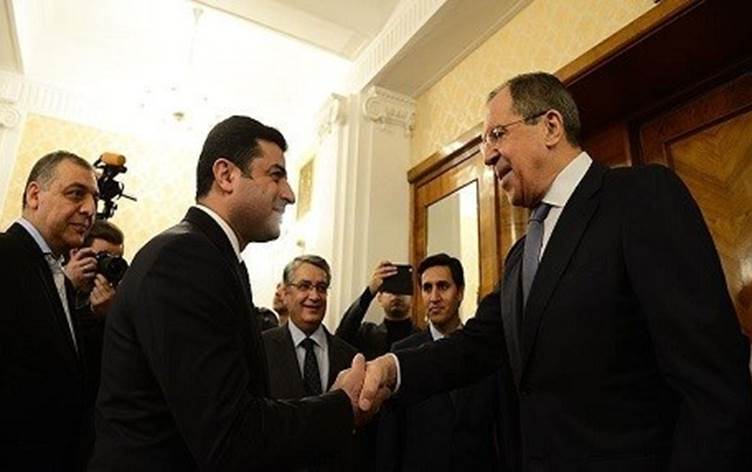ERBIL, Kurdistan Region – Russian Foreign Minister Sergei Lavrov said Wednesday that Moscow is ready to back Kurdish forces fighting ISIS in Syria, but only in coordination with the Syrian government, Turkey’s official Anadolu Agency reported.
Demirtas' visit to Moscow comes amid soured relations between Turkey and Russia over the downing of a Russian jet last month.
“We know very well that there are Iraqi and Syrian Kurds that are fighting against the Daesh (ISIS) threat on the ground," Anadolu quoted Lavrov as saying at a press conference with Demirtas.
“They (Kurds) are fighting for their right to live in their homes and for their right to live in their own land, with Iraqi and Syrian armies," Lavrov said.
“Of course, this is their essential right. They have rights, just like Christians, Yezidis and other minorities have the right to stay in their own land, to live in the land of their ancestors,” Lavrov reportedly said.
Moscow is ready to support anyone fighting ISIS "as part of (Russia's) counter-terrorism operation with the Syrian administration," he said.
Russia has not openly expressed support for Demirtas’ pro-Kurdish Peoples’ Democratic Party (HDP), but has in recent weeks hailed Syrian Kurds as an effective fighting force against ISIS.
Demirtas’ visit also coincides with a crackdown by Turkey on the outlawed Kurdistan Democratic Party (PKK) since late July. More than 100 PKK rebels have been killed by Turkish forces since Dec. 15 alone, without any let-up by the security forces.
The HDP is set to open a bureau in the Russian capital but Demirtas’ visit has received criticism from some Turkish politicians, according to Anadolu.
Turkish Deputy Prime Minister Yalcin Akdogan said earlier this week that HDP members were “running towards any country that has problems with Turkey instead of being on the side of their country to say ‘how can we help?’” the agency reported.
HDP officials said that Demirtas met on Tuesday with members of the Kurdish business community in Moscow.
He is accompanied by party officials including foreign relations head Nazmi Gur.
Demirtas' visit to Moscow comes amid soured relations between Turkey and Russia over the downing of a Russian jet last month.
“We know very well that there are Iraqi and Syrian Kurds that are fighting against the Daesh (ISIS) threat on the ground," Anadolu quoted Lavrov as saying at a press conference with Demirtas.
“They (Kurds) are fighting for their right to live in their homes and for their right to live in their own land, with Iraqi and Syrian armies," Lavrov said.
“Of course, this is their essential right. They have rights, just like Christians, Yezidis and other minorities have the right to stay in their own land, to live in the land of their ancestors,” Lavrov reportedly said.
Moscow is ready to support anyone fighting ISIS "as part of (Russia's) counter-terrorism operation with the Syrian administration," he said.
Russia has not openly expressed support for Demirtas’ pro-Kurdish Peoples’ Democratic Party (HDP), but has in recent weeks hailed Syrian Kurds as an effective fighting force against ISIS.
Demirtas’ visit also coincides with a crackdown by Turkey on the outlawed Kurdistan Democratic Party (PKK) since late July. More than 100 PKK rebels have been killed by Turkish forces since Dec. 15 alone, without any let-up by the security forces.
The HDP is set to open a bureau in the Russian capital but Demirtas’ visit has received criticism from some Turkish politicians, according to Anadolu.
Turkish Deputy Prime Minister Yalcin Akdogan said earlier this week that HDP members were “running towards any country that has problems with Turkey instead of being on the side of their country to say ‘how can we help?’” the agency reported.
HDP officials said that Demirtas met on Tuesday with members of the Kurdish business community in Moscow.
He is accompanied by party officials including foreign relations head Nazmi Gur.



Comments
Rudaw moderates all comments submitted on our website. We welcome comments which are relevant to the article and encourage further discussion about the issues that matter to you. We also welcome constructive criticism about Rudaw.
To be approved for publication, however, your comments must meet our community guidelines.
We will not tolerate the following: profanity, threats, personal attacks, vulgarity, abuse (such as sexism, racism, homophobia or xenophobia), or commercial or personal promotion.
Comments that do not meet our guidelines will be rejected. Comments are not edited – they are either approved or rejected.
Post a comment